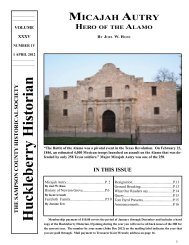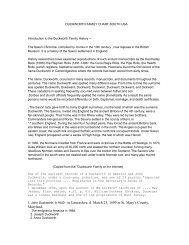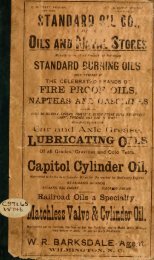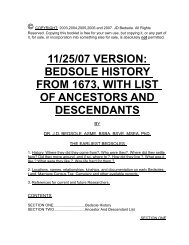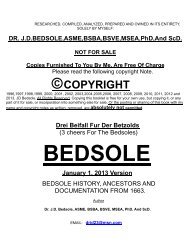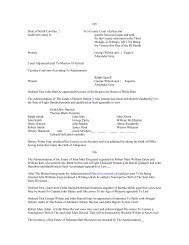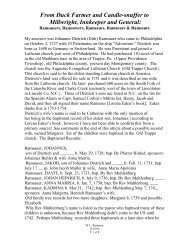Bedsole History from 1673 With Documentation - NCGenWeb
Bedsole History from 1673 With Documentation - NCGenWeb
Bedsole History from 1673 With Documentation - NCGenWeb
You also want an ePaper? Increase the reach of your titles
YUMPU automatically turns print PDFs into web optimized ePapers that Google loves.
Edward, listed as landowner several times, above, was born to Thomas <strong>Bedsole</strong>, Jr. and Charlotte English in<br />
1819 in Beaverdam, NC. He died in 1909 and is buried in Clarke County, Coffeeville, Alabama. You can see<br />
above, that others also moved to or were born in, Clarke County. He was about twelve years old when they<br />
moved <strong>from</strong> NC to Alabama. He was married to Susan Blackwell and they lived in Crenshaw County,<br />
Alabama initially, but he moved his family to Mossy Head, Florida about 1853, then to Clarke County.<br />
(Coffeeville). About 1891, Edward moved to Grove Hill (Coffeeville), Alabama where he, his son Quincy and<br />
Edwards sister Elizabeth’s son Rayford, built a log store at the crossroads between Coffeeville and Grove<br />
Hill, Alabama. Over the next couple of years, they developed a group of drinkers, smokers, snuff users,<br />
tobacco chewers, never-do-wells, hangers-on and trouble-makers, who frequently gathered at the store and<br />
discussed politics and how they were all being wronged by the local politicians. Eventually, Edward and<br />
Rayford began selling moonshine whiskey <strong>from</strong> the store and the gang which gathered there <strong>from</strong> time to<br />
time now numbered perhaps 50-60 men. Over time, they turned to stealing <strong>from</strong> politicians at first, but that<br />
practice grew until their victims included their own neighbors, who were just poor, ordinary farmers.<br />
Over time, Edwards gang developed a hatred for the merchants in Grove Hill and in the county, who charged<br />
outrageous prices and sometimes took any property the farmers owned in payment, and when they,<br />
especially the sharecroppers, could not pay their bills after harvest time, the gang began stealing <strong>from</strong> the<br />
merchants own stores and their harvested crops too. Big landowners also began to fall victim to the gang for<br />
the same reasons. If the gang decided they wanted someones corn, cotton, pigs, cattle, or other property,<br />
they simply showed up in the dead of night and took what they wanted. If the owner objected with violence,<br />
he was simply shot, for his trouble. The local sheriff was always “too busy”, or “out of town”, to do any law<br />
enforcement of this gang, after all the sheriff lived among them, and shortly, they began taking whatever<br />
PAGE THIRTY SIX<br />
they wanted <strong>from</strong> whoever had it. Their hatred spread to include local politicians. Finaly, five good men <strong>from</strong><br />
the area sent a telegram to the Governor of Alabama, explaining the situation to him and asking him to send<br />
army troops to arrest the gang. Instead, the Governor, not being the brightest bulb in Montgomery,<br />
telegraphed the Sheriff asking for clarification and the sheriff replied he had everything under control and<br />
downplayed the problem to the Governor. When they saw the Governor was not going to do anything, the<br />
same five men went to adjoining counties and rounded up a group of 300 men, each one armed with the new<br />
Winchester repeating rifles.<br />
These 300 men converged on Edwards house.They found Edward and son Quincy, there and killed Quincy<br />
and a few others and ran the rest of Edwards gang out of the county. Ironically, although he was the<br />
ringleader, Edward also held a high degree in the local Masons, who are pledge to always take care of each<br />
other, and several of the three hundred men in the gang were also Masons. So Edward was allowed to go<br />
because of that, provided he “left this country and never returned". Edward stayed away for about twelve<br />
years, but moved back to Coffeeville, where he lived to the ripe old age of ninety-three. Proving the adage<br />
that the meaner you are, the longer you live. Edward died in 1909 and is buried in Clarke County, Alabama,<br />
in New Prospect Cemetary, along with Susan Blackwell, his wife and a few of their relatives.<br />
That story can be found more or less in its entirety in a booklet entitled “The Mitchum War Of Clarke County,<br />
Alabama”, obtainable <strong>from</strong> The Clarke County Democrat newspaper, P.O. Box 39, Grove Hill, Alabama<br />
36451. I recently read in the newspaper that a writer, perhaps unrelated to the <strong>Bedsole</strong>s had rewritten the<br />
Edward <strong>Bedsole</strong> story, in a much more comprehensive manner, perhaps flowering it up quite a bit and in fact,<br />
downright making much of it up, and that it was becoming a best seller. I have since heard that the new<br />
version portrays Edward as a sort of hero, born in Ireland !. In addition, a movie based on that new book is<br />
being contemplated. The name of the new book is “Hell At The Breech”, which was actually what Edward<br />
named his gang at Grove Hill. Wierd name for a gang of thieves and murderers.<br />
James Larkin <strong>Bedsole</strong>s Fight For Food



